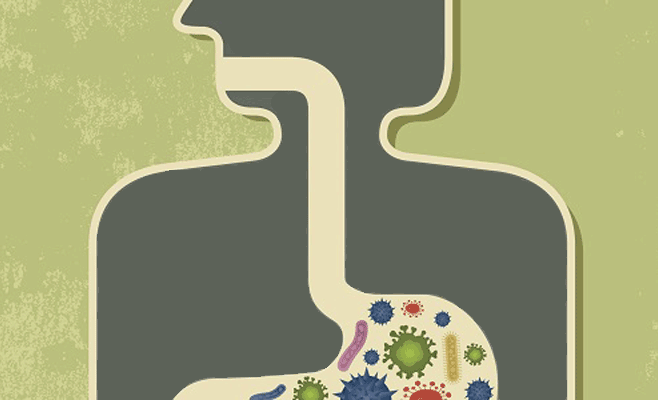We’re talking about the three pounds (1,5kg) of bacteria that live in our guts. It plays a vital role helping with a variety of biological tasks helping to protect you from harmful bacteria and fungi. Probably because we can’t see it, we take it for granted until it starts to go wrong. We should all appreciate just how important our intestinal flora is to our health, in fact we can’t survive without them. Imagine an army of millions helping us digest food, especially certain types of fibre that is impossible to digest without their help. They build our natural defences sending signals to our immune system and help regulate inflammation. One way in which they do this is by forming a microscopic ‘protective carpet’ on our intestinal surface and then acting like thousands of tiny ‘surveillance sentries’, help stop germs entering the body through the digestive tract.
The micro-flora is made up of both friendly and hostile bacteria whereby the norm is around 85% beneficial and 15% bad bacteria. There are many factors, such as diet, the environment, food poisoning, gut infections, illness, antibiotics, stress, lack of sleep and aging that can impact this balance allowing less desirable types of bacteria to get the upper hand, putting the micro-flora out of balance, sometimes with devastating effects.
Gut bacteria, influences every system in the body, so maintaining a healthy gut microbiome with prebiotics is of utmost importance. Researchers have discovered that the amount and type of bacteria in our gut also plays a role in weight gain or weight loss.
What Are Probiotics and Prebiotics?
- Prebiotics are types of fibre that friendly bacteria thrive on.
- Probiotics are live bacteria found in certain foods or supplements.
Eat Prebiotic Fibre-Rich Food
When we think about promoting gut bacteria, probiotic supplements are generally the first thing people think of as they are advertised so much. The colon prefers a stable, slightly acidic environment, which inhibits the growth of undesirable bacteria like Salmonella, Shigella, and E. coli. This can be achieved by eating plenty of prebiotic foods to improve gut cultures.
Different vegetables have different types of fibre so go for a wide range of fibre-rich foods rather than just sticking to one of two kinds. This should include vegetables with a wide range of colours and textures. Most nuts and seeds are high in fibre.
Chia and flaxseeds are especially recommended. Soak them overnight in water at room temperature with a dash of lemon (acidic) making them highly hydrating and soothing for the gut.
Inulin-rich foods leeks, onions, garlic, bananas, asparagus and Jerusalem artichokes are well researched highly soluble fibre that has many gut health benefits. Due to bloating and wind, it can be challenging for those with IBS-type issues, so use with caution.
Beneficial Bacteria are scientifically proven to do the following:
- Keeping the colon clean and healthy
- Raising immunity by increasing the number of immune cells in the body
- Helping to replenish nutrients lost while taking antibiotics
- Promoting immunity by producing their own antibodies
- Promoting regular bowel habits
- Protecting against environmental toxins
- Destroying fungal overgrowth
- Preventing infection
- Cleaning the digestive tract
- Promotes energy and stamina which helps to counter fatigue
- Helps to maintain hepatic health and a healthy liver
Overdoing Prebiotic foods with an unbalanced micro-flora can be detrimental. Feed your microbiome a varied menu, not only fiber. In fact, even with a well balanced prebiotic diet, containing all types hard-to-digest-cabohydrates, if you eat too much of them it will make you sick and give you stomach cramps. The key is to eat it in moderation. If you start to detect side effects, reduce the amount. Starting with small prebiotic quantities, will selectively feed the good guys, helping them grow a strong colony. If you take more prebiotic than your good bacteria can handle, you will end up by feeding the bad bacteria too. Considering all the above, it makes sense to ensure you are getting good bacteria in our gut every day. The general food we eat today is just not enough to maintain a healthy body, that's why you should eat probiotic foods on a regular basis as well.
Eat Probiotic Fermented Foods
Foods like natural live bio-yogurt, sauerkraut, fermented poi, feta cheese, blue cheese and soft cheeses, kefir, sour milk, buttermilk, sour cream, rejuvelac and brottrunk contain probiotic i.e. live friendly bacteria. As these are live they must be kept in the refrigerator, anything found on the shop shelf will not be live. All fermented foods taste sour as the fermentation removes the natural sugars in the food so they’re not for everyone. As a reminder, if you are taking oral antibiotics, schedule your probiotics so that you take them in the hours in between your doses of antibiotics.
Use Probiotic Supplements
Although eating fermented foods is by far the most natural way to increase probiotic bacteria and improve gut flora, taking supplements are especially useful for those who don't like the taste of fermented foods. The time has gone when you must refrigerate probiotic supplements, but you will still need to protect the bacteria from too much exposure to light, heat, and moisture. The refrigerator is probably the best place for this. If you’re taking antibiotics or drinking highly chlorinated water, then no number of probiotic supplements are going to help only real food.













